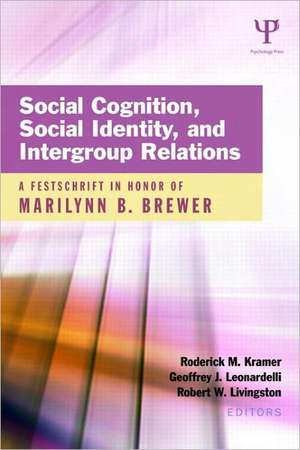Social Cognition, Social Identity, and Intergroup Relations: A Festschrift in Honor of Marilynn B. Brewer: Psychology Press Festschrift Series
Editat de Roderick M. Kramer, Geoffrey J. Leonardelli, Robert W. Livingstonen Limba Engleză Hardback – 25 mai 2011
The volume will be of interest to social psychologists, industrial/organizational psychologists, clinical psychologists, and sociologists.
Preț: 776.19 lei
Preț vechi: 1109.81 lei
-30% Nou
Puncte Express: 1164
Preț estimativ în valută:
148.52€ • 155.51$ • 123.19£
148.52€ • 155.51$ • 123.19£
Carte tipărită la comandă
Livrare economică 10-24 aprilie
Preluare comenzi: 021 569.72.76
Specificații
ISBN-13: 9781848729353
ISBN-10: 1848729359
Pagini: 435
Ilustrații: 15 b/w images and 18 tables
Dimensiuni: 152 x 229 x 34 mm
Greutate: 1.12 kg
Ediția:New.
Editura: Taylor & Francis
Colecția Psychology Press
Seria Psychology Press Festschrift Series
Locul publicării:Oxford, United Kingdom
ISBN-10: 1848729359
Pagini: 435
Ilustrații: 15 b/w images and 18 tables
Dimensiuni: 152 x 229 x 34 mm
Greutate: 1.12 kg
Ediția:New.
Editura: Taylor & Francis
Colecția Psychology Press
Seria Psychology Press Festschrift Series
Locul publicării:Oxford, United Kingdom
Cuprins
R.W. Livingston, G.J. Leonardelli, R.M. Kramer, Rigor with Relevance: The Many Legacies of Marilynn Brewer. Part 1. Social Cognition. M. Karasawa, Categorization-Based Versus Person-Based Explanations of Behaviors: Implications from the Dual-Process Model. D.L. Hamilton, J.M. Chen, N. Way, Dynamic Aspects of Entitativity: From Group Perceptions to Social Interaction. L.R. Caporael, G.D. Reeder, New Evolutionary Perspectives on Theory of Mind. Part 2. Social Identity and Intergroup Relations. K. Schmid, M. Hewstone, Social Identity Complexity: Theoretical Implications for the Social Psychology of Intergroup Relations. G.J. Leonardelli, C.L. Pickett, J.E. Joseph, Y.D. Hess, Optimal Distinctiveness in Nested Categorization Contexts: Moving from Dueling Identities to a Dual Identity. C.L. Pickett, P. Smaldino, J. Sherman, J. Schank, Agent-Based Modeling as a Tool for Studying Social Identity Processes: The Case of Optimal Distinctiveness Theory. A.C. Rumble, Religion as Collective Identity. K. Gonsalkorale, W. von Hippel, Intergroup Relations in the 21st Century: Ingroup Positivity and Outgroup Negativity Among Members of an Internet Hate Group. M.M. McDonald, C.D. Navarrete, J. Sidanius, Developing a Theory of Gendered Prejudice: An Evolutionary and Social Dominance Perspective. W.D. Crano, V. Hemovich, Intergroup Relations and Majority or Minority Group Influence. M. Yuki, Intragroup Relationships and Intergroup Comparisons as Two Sources of Collectivism. Part 3. Applications and Implications. S. Schneider, W.M. George, S. Carroll, E.D. Middleton, How Leaders Transform Followers: Organizational Identity as a Mediator of Follower Attitudes in Two Samples. R.M. Kramer, Cooperation and the Commons: Lab and Field Explorations of a Persistent Dilemma. E. Castano, Moral Disengagement and Morality Shifting in the Context of Collective Violence. W.W. Maddux, A Movable Feast: How Transformational Cross-Cultural Experiences Facilitate Creativity. Y.-R. Chen, G. Zhao, J. Lee, Trust in the Manager as a Supervisor or a Group Leader? Toward a Relational Versus Collective Distinction in Procedural Justice. Part 4. Reflections and Conclusion. M.B. Brewer, In Retrospect.
Recenzii
"The book covers a lot but its organization into three parts helps readers orient themselves around Marilyn Brewer’s lasting impact on the field. For social psychological and organizational behaviour scholars, there are sure to be chapters here of relevance and importance to their own work. ... Professor Marilyn B. Brewer is well deserving of all 423 pages. " - Katherine W. Phillips, Columbia Business School, USA, in Administrative Science Quarterly
"Readers will have a clearer sense of the comprehensiveness of [Marilynn] Brewer’s work and a glimpse into the privilege of her mentorship. ... Social Cognition, Social Identity, and Intergroup Relations speaks to a wide variety of audiences. Though primarily geared toward social psychologists, it would also be of interest to developmental psychologists, industrial/organizational psychologists, and gender studies." - Stephanie Afful, Ph.D., Fontbonne University, USA in PsycCRITIQUES
"This volume documents, in the chapters by several generations of leading social psychologists, the enduring conceptual and empirical impact that Marilynn Brewer’s scholarship, mentorship, and professional vision and leadership have had on the field. The book not only highlights her many significant contributions and chronicles her innovative insights, but also reveals how these contributions reflect an integrated, penetrating analysis of group life, social cognition, identity, and meaning. The book builds on Marilynn Brewer’s previous accomplishments to chart the course of social psychology well into the future." - John Dovidio, Yale University, USA
"Marilynn Brewer is one of social psychology’s most distinguished scholars. Through her work on dual process models, optimal distinctiveness, social identity complexity, relational self, trust, dilemmas, and diversity she has transformed our understanding of intergroup relations and the role of social identity in intergroup behavior. This festschrift is a powerful testimony to Brewer’s impact, captured through the eyes of her students and collaborators – all leading figures in the field." - Michael A. Hogg, Claremont Graduate University, USA
"A wonderful collection of intriguing and far reaching essays that honor one of social psychology’s most powerful and creative thinkers. That each chapter both makes an original contribution and addresses the legacy of Professor Brewer attests to the breadth and richness of her intellectual scope. Marilynn Brewer deserves a fitting Festschrift volume and this is it." - Dale T. Miller, Director of the Stanford Graduate School of Business' Center for Social Innovation, Stanford Graduate School of Business, USA
"Readers will have a clearer sense of the comprehensiveness of [Marilynn] Brewer’s work and a glimpse into the privilege of her mentorship. ... Social Cognition, Social Identity, and Intergroup Relations speaks to a wide variety of audiences. Though primarily geared toward social psychologists, it would also be of interest to developmental psychologists, industrial/organizational psychologists, and gender studies." - Stephanie Afful, Ph.D., Fontbonne University, USA in PsycCRITIQUES
"This volume documents, in the chapters by several generations of leading social psychologists, the enduring conceptual and empirical impact that Marilynn Brewer’s scholarship, mentorship, and professional vision and leadership have had on the field. The book not only highlights her many significant contributions and chronicles her innovative insights, but also reveals how these contributions reflect an integrated, penetrating analysis of group life, social cognition, identity, and meaning. The book builds on Marilynn Brewer’s previous accomplishments to chart the course of social psychology well into the future." - John Dovidio, Yale University, USA
"Marilynn Brewer is one of social psychology’s most distinguished scholars. Through her work on dual process models, optimal distinctiveness, social identity complexity, relational self, trust, dilemmas, and diversity she has transformed our understanding of intergroup relations and the role of social identity in intergroup behavior. This festschrift is a powerful testimony to Brewer’s impact, captured through the eyes of her students and collaborators – all leading figures in the field." - Michael A. Hogg, Claremont Graduate University, USA
"A wonderful collection of intriguing and far reaching essays that honor one of social psychology’s most powerful and creative thinkers. That each chapter both makes an original contribution and addresses the legacy of Professor Brewer attests to the breadth and richness of her intellectual scope. Marilynn Brewer deserves a fitting Festschrift volume and this is it." - Dale T. Miller, Director of the Stanford Graduate School of Business' Center for Social Innovation, Stanford Graduate School of Business, USA
Descriere
This volume, to honor Marilynn Brewer, contains original theory and research from leading social psychologists who study social identity theory, intergroup relations, cooperation and conflict, and the psychology of the self. It will be of interest to social psychologists, industrial/organizational psychologists, clinical psychologists, and sociologists.



























